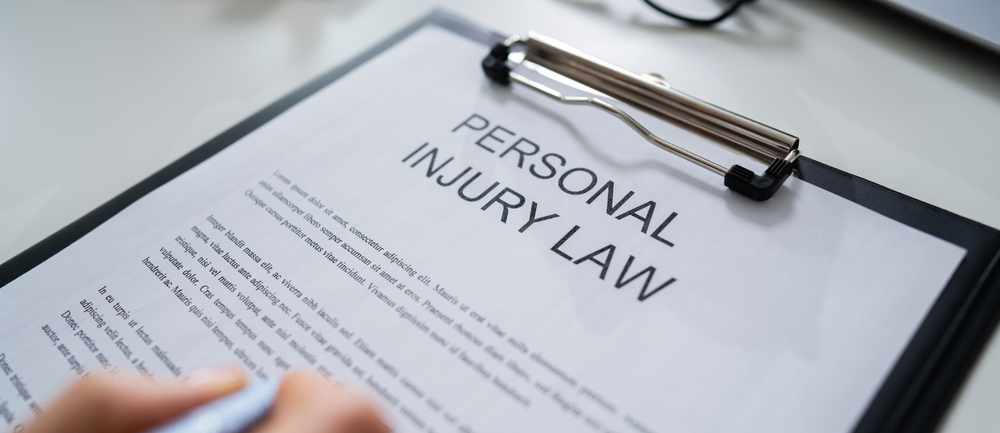
Understanding “what to know about personal injury law in 2024” is vital for anyone pursuing a claim. With legal landscapes evolving, knowing your options and rights can be the difference between a straightforward process and prolonged disputes. In this guide, you’ll learn the critical aspects of filing a claim, engaging with insurance, and choosing legal representation—all tailored to 2024’s updated regulations. Equip yourself with the key information to confidently manage your personal injury case.
Key Takeaways
-
Personal injury law in Florida covers a wide range of claims and operates on a preponderance of evidence, necessitating experienced lawyers to manage the intricacies and achieve fair compensation.
-
Insurance plays a pivotal role in personal injury cases, and Florida law mandates drivers to carry minimum coverage. Understanding the differences between insurance claims and personal injury lawsuits is essential.
-
The statute of limitations for personal injury claims in Florida is generally four years, with exceptions for specific cases and scenarios, such as minors and medical malpractice.

Deciphering Personal Injury Law in 2024
Delving into the intricate legal landscape of personal injury law is a challenging endeavor. A thorough understanding of its foundational principles and workings, Equips you to handle your personal injury claim with confidence. Personal injury law in Florida encompasses an extensive array of claims and hinges on demonstrating evidence that more likely than not supports your case. To successfully manage this domain, securing an experienced personal injury lawyer who can adeptly interpret relevant statutes, establish the merits of your claim, and secure just compensation is essential.
In our discussion here we aim to unpack the complexities inherent in Florida’s personal injury laws—offering clarity on what it entails, how it functions within the state’s jurisdictional bounds, and what types of situations it may encompass for those pursuing a potential claim under its provisions.
What is Considered Personal Injury Law?
In the context of law, personal injury is defined as damage inflicted on a person due to another’s negligence or deliberate actions. This type of harm may include physical injuries, property losses, or psychological suffering. Circumstances leading to personal injury cases are diverse and can encompass incidents such bicycle accidentsas car accidents, errors in medical treatment, or intentional offenses like assault.
Those who suffer from personal injuries commonly experience emotional distress and turmoil owing to accumulated medical expenses, potential disabilities, and the loneliness that accompanies their recovery process. It’s important to note that significant repercussions can result even from seemingly minor injuries. Thus these should not be disregarded.
How Does Personal Injury Law Work?
In order to be victorious in a personal injury case, one must establish that the defendant owed a duty of care to the plaintiff, violated this duty via negligent or deliberate conduct, and consequently caused harm. This is typically resolved through either settlement discussions or court proceedings.
Within the framework of a personal injury lawsuit, it falls upon the plaintiff to substantiate their claims with evidence that tips the balance in favor of them being more probable than not that liability rests with the defendant. Medical professionals are instrumental in demonstrating how exactly the actions (or lack thereof) of the defendant have led directly to injuries sustained by plaintiffs, which often influences decisions regarding responsibility.
What Does Personal Injury Law Cover?
Florida’s injury law encompasses an extensive array of personal injury claims. It is essential for individuals involved in such matters to comprehend the nuances of Florida’s personal injury laws and cases. These can involve incidents ranging from vehicle and motorcycle accidents to dog attacks, as well as wrongful death, medical negligence, maltreatment or disregard within care homes, malfunctioning products, and instances fueled by careless or deliberate behavior.
The laws are designed to offer protection for those who have suffered injuries due to others’ actions—ensuring they possess the means to pursue monetary damages when harm has been inflicted upon them through someone else’s neglect or intentional misconduct.
Specific rules are in place concerning particular types of personal injury lawsuits. For example, health service professionals must adhere strictly to established medical protocols in order not to be held liable if accused of malpractice while cyclists under the age of 16 are legally required to wear helmets by Florida regulations. To establish fault successfully in a lawsuit concerning personal damage liability claimants need to show that there was failure comply with legal responsibilities owed thus leading to injuries sustained. Whether it entails proving property owner left hazardous conditions unaddressed culminated accident prove direct assault battery occurred due to willful acts another person.

The Necessity of Insurance in Personal Injury Cases
Insurance is a crucial element in personal injury cases, serving as a financial buffer for individuals who suffer from accidents. It assists with covering the costs of medical treatment and offsets any income loss that may result from these incidents. Florida law requires constant insurance coverage, which applies even to vehicles that are not operational or currently being used.
In this part, we will explore the complexities involved in insurance regarding personal injury matters. We’ll examine the particularities related to auto insurance and personal injury protection while also distinguishing between filing insurance claims and pursuing personal injury lawsuits.
Auto Insurance and Personal Injury Protection
Under the regulations set by Florida law, anyone registering a vehicle is required to provide evidence of having at least $10,000 in Personal Injury Protection (PIP) as well as an equal amount in Property Damage Liability (PDL). This documentation must be obtained from an insurance company that is authorized to operate within Florida or alternatively through a self-insurance certificate provided by FLHSMV.
Florida adheres to a no-fault insurance model which stipulates that drivers should submit claims for accidents with their own insurers irrespective of who was at fault. This system has exceptions when it comes to severe injuries.
Insurance Claims vs. Personal Injury Lawsuits
In Florida, initiating a personal injury claim usually starts by filing with the insurance company of the party at fault. This can potentially lead to resolving the matter outside court through a settlement. The advantages of settling with an insurance company include time savings, reduced legal costs, faster payment receipt, and eliminating litigation stress. Processing times for these insurance claims can be prolonged at the insurer’s discretion and may conclude in settlements that don’t sufficiently address all expenses incurred by those injured.
Insurance firms often aim to minimize their client’s responsibility and might challenge how much blame rests on the claimant. This situation requires adept legal counsel. Personal injury lawsuits typically entail more time commitment, increased financial burden from attorney fees as well as other judicial charges and could result in uncertain outcomes—juries can grant varying compensation levels or none at all.
Choosing between proceeding with an insurance claim or pursuing a personal injury lawsuit hinges upon factors such as desired resolution quickness vs. engaging in courtroom battles versus securing complete recompense for every damage endured.

Compensation Dynamics in Personal Injury Claims
Understanding the complexities of a personal injury claim is crucial, but knowing how compensation is determined is key to securing an equitable and fair settlement amount. In Florida, those pursuing personal injury claims may be entitled to recover economic damages and non-economic damages. Punitive damages might also apply in certain situations.
We will explore more about the different components of compensation within this context to shed light on what you could anticipate from your own personal injury claim. This exploration aims at clarifying the often perplexing process associated with these kinds of legal claims and actions.
Economic Damages: The Tangible Losses
Financial losses stemming from various sources can include, but are not limited to:
-
Expenses incurred for medical treatment
-
Costs of subsequent doctor visits
-
Charges related to rehabilitation services
-
Expenditure on aids for mobility
-
Payments for in-home care assistance
-
Fees associated with hospital and emergency room use
-
Prices attached to essential diagnostic imaging like MRIs, X-rays, and CT scans
To these costs, individuals may suffer a financial hit due to lost wages if their injury prevents them from working or diminishes earning capacity that influences future income potential.
To claim such economic damages effectively requires substantiating evidence. This typically involves presenting employment records alongside estimations that articulate the impact on one’s ability to earn an income going forward.
The fiscal ramifications following an injury should never be underestimated. They are often substantial regardless of whether the harm is deemed minor or severe. Financial burdens quickly mount: a routine visitation after an accident averages at about $3,300 while necessary hospital stays post-injury have been known to soar up to $57,000.
Non-Economic Damages: Beyond the Financial Impact
Personal injury cases frequently account for non-economic damages that compensate accident victims for losses which are not financial but deeply impact the victim’s life. These include, but are not limited to:
-
The physical and emotional experience of pain and suffering
-
Emotional distress endured by the individual
-
Psychological repercussions like mental anguish
-
Deterioration in the ability to relish life
The extent of compensation awarded for pain and suffering depends on a variety of factors such as how severe the injury is, the age of those injured, any ongoing medical treatments required, pre-existing health conditions before the incident occurred, as well as how much economic loss was suffered.
When considering non-economic damages in personal injury cases, it’s important to recognize their role in addressing elements beyond financial loss. This encompasses consequences affecting one’s day-to-day living capabilities: psychological states including PTSD or depression triggered by injuries. And alterations experienced within personal relationships with close family members or partners due to trauma from an accident.
Punitive Damages: In Cases of Gross Misconduct
Punitive damages serve the purpose of punishing a defendant for conduct that is especially offensive and to prevent similar misconduct in the future, rather than providing restitution to the victim. Specifically in Florida, such damages are reserved for instances where there has been extreme wrongdoing like triple damages or botched surgery, and when actions taken by the defendant have been particularly detrimental or exhibited sheer recklessness.
When judges in Florida deliberate on awarding punitive damages, they take into account several factors including: how severe and extensive the harm was, how long the misconduct persisted, and whether or not the defendant recognized their actions as wrongful.
Understanding Comparative Negligence in Florida
In cases of personal injury, it’s not uncommon for both the plaintiff and defendant to bear responsibility for serious injuries. The principle of comparative negligence is applicable in such situations. Under Florida’s pure comparative negligence statute, compensation can be adjusted if the person who suffered harm is partly at fault for their personal injuries too. The law enables apportioning liability between both involved parties based on each one’s contribution to the accident.
We will examine more closely how this notion of comparative negligence affects your claim and address the complexities associated with shared blame following accidents.
How Comparative Negligence Influences Your Claim
In the state of Florida, the concept of comparative negligence dictates that fault is allocated according to how much each party contributed to causing an accident. Under this legal framework, any compensation awarded to a person who has sustained injuries will be reduced by their own share of responsibility for the incident. The court adjusts the award based on each involved party’s designated percentage of fault.
Even when plaintiffs hold partial blame in an event leading to injury, they are still eligible to receive non-economic damages within Florida as long as their portion of fault does not exceed 50%.
Understanding Shared Fault in Accidents
In accidents where fault is shared:
-
It’s necessary to assess the negligence attributed to each party
-
Compensation is modified in relation to their specific share of blame
-
The particular extent of negligence for each individual involved is considered
-
Recovery of damages permitted aligns with the respective amount of fault assigned
The process to establish the degree of blame for each involved entity during an accident encompasses hurdles like resolving disparate narratives, addressing complications due to any prior health issues, and contending with tactics that insurance firms employ in efforts to reduce their financial responsibility.

Selecting the Right Personal Injury Lawyer
Selecting an adept and experienced personal injury lawyer is vital for the favorable outcome of your personal injury claim. A skilled attorney in this field will guide you through the intricate legal process with dedication, defending your entitlements and striving to secure just recompense for you.It’s imperative to opt for a lawyer with demonstrated success in managing cases analogous to yours amid the various choices present.
The forthcoming discussion will delve into aspects that should influence your choice of a personal injury lawyer. These criteria include their level of experience, standing within the legal community, and availability of appropriate resources.
Experience Matters: Finding a Specialist
When selecting a lawyer, their expertise in personal injury cases should not be overlooked. A seasoned personal injury attorney will adeptly manage the myriad of legal processes, anticipate possible challenges, and strive for maximum recompense for your harm sustained. As you meet with them initially, it is essential to assess their proficiency in tort law, establish a good connection and verify that communication is transparent.
The aptitude of an experienced attorney in tackling different aspects of a case reflects their all-encompassing skills and resources at hand. This includes scrutinizing insurance policies meticulously, negotiating effectively with insurers on your behalf, and preparing thoroughly for any potential trial scenarios that may arise.
Reputation and Resources: What to Look For
The stature and assets at the disposal of a lawyer are equally essential factors to take into account. You can gauge a lawyer’s standing by looking into various indicators:
-
Exploring reviews from previous clients
-
Investigating their track record in cases akin to yours
-
Assessing their evaluations on Google as well as other online platforms
-
Soliciting insights from the local Bar Association
It is vital that a personal injury lawyer possesses sufficient monetary resources to afford investigative expenditures, secure expert witnesses, and handle all related legal fees. This financial capability is key for thoroughly building and effectively presenting your case.

The Statute of Limitations and Your Personal Injury Case
Grasping the importance of Florida’s statute of limitations regarding personal injury claims is essential in maintaining your eligibility to pursue damages. The timeframe for filing most personal injury claims within the state typically extends up to four years, with certain variations applicable to minors and particular kinds of cases.
In this segment, we will explore the deadlines associated with initiating a claim as well as highlight various exemptions that may alter these time constraints.
Time Limits on Filing a Claim
In Florida, the statute of limitations for a majority of personal injury claims typically spans four years starting from the incident date. Certain circumstances alter this period. For instance, when minors are involved in an accident, their window to file can be extended up to seven years after sustaining the injury or until they reach a specific age. Those filing wrongful death claims need to do so within two years.
It is crucial to commence legal proceedings expeditiously following an incident related to personal injury or wrongful death in order to ensure that all evidence remains intact, key witnesses are questioned promptly, and necessary legal paperwork is filed well before the established deadline as per Florida’s statute of limitations regarding such matters.
Exceptions to the Rule
In certain cases, deviations from the usual statute of limitations are permissible. As an example, within Florida:
-
Cases involving medical malpractice and wrongful death claims adhere to a distinct two-year period for the statute of limitations.
-
Should the injured party suffer from cognitive impairment that hinders their decision-making ability temporarily, the limitation period can be paused or “tolled.”
-
Should the defendant exit state boundaries, it is possible to lengthen this prescribed time limit providing plaintiffs with additional duration to initiate legal action.
The regular timeline set by the statute of limitations may undergo modifications when dealing with minors or instances where harm isn’t immediately apparent—potentially prolonging opportunities for filing such claims.
Alternative Dispute Resolution in Personal Injury Cases
In cases of personal injury, Alternative Dispute Resolution (ADR) presents a practical substitute to the standard court proceedings. ADR approaches such as mediation and arbitration tend to be less costly and quicker, often resulting in agreements that are agreeable to all parties concerned.
We shall explore the primary types of ADR applied in personal injury cases – specifically, mediation and arbitration – within this segment.
Mediation: A Path to Settlement
In a personal injury case, mediation serves as an alternative dispute resolution (ADR) technique that enables both parties to reach a settlement without enduring the lengthy duration, financial burden, and psychological pressure associated with going to trial. Plaintiffs receive remuneration without waiting for their day in court or experiencing the anxiety associated with giving testimony. Similarly, defendants gain by settling matters related to responsibility without confronting the uncertainties and additional costs that come with a trial.
Throughout the process of mediation, an adept mediator is engaged to facilitate discussion between both sides. Their role involves helping them agree on a just monetary compensation amount which one party agrees to pay and which the other consents to receive as monetary compensation, in order ease their conflict amicably.
Arbitration: A Binding Decision
In contrast, arbitration serves as a binding alternative dispute resolution method where typically a former judge acts as the arbitrator to decide the fate of a personal injury case. This procedure in Florida aims for expedited settlements compared to standard court proceedings, intending to conclude within 30 days following the initial hearing. Decisions have to be documented and delivered in written form within ten days following the last hearing.
During an arbitration proceeding in Florida concerning personal injury disputes, participants have the liberty to select their own arbitrator instead of being assigned one by default through jurisdictional authority. Arbitrators hold power over issuing directives that help maintain an organized and effective progression throughout the hearings.
The Journey Through the Legal System
Understanding the complexities of managing a personal injury claim within the legal system is crucial. Each segment, starting from the immediate actions following an injury through to the discovery phase and culminating in trial, significantly influences the result of your injury claim.
We will guide you through each critical stage of a personal injury case in this section, offering an exhaustive perspective on what to expect throughout your legal journey.
Initial Steps After an Injury
In the aftermath of a personal injury event, several vital actions must be undertaken promptly.
-
It is imperative to get medical attention right away for both an accurate assessment and commencement of necessary care.
-
Gather proof by capturing images at the scene where the mishap took place.
-
Secure the other involved parties’ contact information along with their insurance details.
-
Ensure to log an authoritative report either with law enforcement or with whoever oversees the location where your accident happened, thereby establishing an official account.
Early engagement with a personal injury lawyer can greatly assist in exploring your legal options following such incidents. Such a professional will provide guidance through each step, simplifying what can often be a complex legal process surrounding personal injuries.
Discovery to Trial: What to Expect
The procedure for gathering evidence in personal injury cases involves several key activities.
-
Submitting written questions known as interrogatories
-
Making formal requests to produce relevant documents
-
Asking parties to admit or deny specific statements through requests for admissions
-
Conducting depositions, which are oral questioning sessions of witnesses by the opposing legal team
-
Issuing subpoenas duces tecum that compel production of physical evidence
-
Ordering examinations to evaluate the mental and physical condition of involved individuals
These actions are designed not only to collect crucial information, but also to avoid any surprises during a trial. Depositions allow attorneys an opportunity to assess how witnesses might be perceived by a jury when giving testimony, while securing necessary documentation from those involved ensures access is granted to pertinent materials.
Prior to entering the courtroom phase, legal representatives may file pre-trial motions including summary judgment efforts aimed at disposing of particular points of law or attempting outright dismissal before facing trial. In instances where out-of-court settlements prove unattainable, a complaint and summons will initiate a civil lawsuit, prompting both claimant and defendant into detailed preparation for presenting their case in front of judge and jury.
The Role of Medical Records in Proving Your Case
In a personal injury claim, medical records are essential as they provide critical proof of the nature and cause of your injuries as well as the associated damages. These documents chronicle everything from your initial diagnosis to the progression of treatment and serve as a fundamental element that can heavily influence any potential financial restitution.
This segment delves into how vital medical documentation is in substantiating your injury claim. We’ll discuss how to collect and present this medical evidence effectively and highlight the significance of testimony from medical professionals within the context of establishing a solid case for compensation.
Gathering and Presenting Medical Evidence
Systematic organization of medical records is crucial for constructing a robust personal injury case. It’s important to keep precise records of all medical interactions, such as visits to the emergency room, hospital admissions, appointments with physical therapists and psychological counselors. Thoroughly documenting each aspect – including detailed accounts of pain and suffering experienced, rehabilitation programs followed and any communication with healthcare professionals – is key in portraying the complete extent of the injury sustained.
Visual evidence also plays an essential role. Thus photographs that illustrate visible injuries are imperative. They provide indisputable proof by showing both how serious the injuries were initially and how they’ve healed over time. Equally critical is recording all incurred serious medical bills and expenses meticulously. Keeping track of every medical bill underscores not only what treatments have cost financially, but also highlights the broader economic repercussions caused by accident-related injuries.
Medical Expert Testimony
In personal injury cases, expert medical witnesses are integral as they deliver unbiased and specialized evaluations of the nature, origin, severity, and repercussions of injuries to help the court grasp intricate medical matters.
These experts are handpicked due to their precise knowledge in medicine pertinent to the plaintiff’s injuries as well as their track record with providing testimony in legal proceedings. Their chief function is an impartial appraisal regarding both sustained injuries and received treatment, which often plays a critical role in swaying the verdict.
Medical experts’ testimonies hold considerable sway over a personal injury case by elucidating not only how severe those injuries are, but also outlining what long-term effects these might have on the injured parties orparty’s lifestyle. This can profoundly affect judgments or settlements within such lawsuits.
Personal Injury Law Myths Debunked
Numerous myths and misconceptions permeate personal injury law, potentially threatening your claim with lost compensation chances or the neglect of crucial legal procedures. We aim to dispel prevalent falsehoods surrounding personal injury lawyers and law in this segment, delivering precise insights that will steer you towards successfully managing your personal injury case.
“Minor Injuries Don’t Matter”
Despite popular belief, small injuries can be crucial in personal injury cases. These lesser wounds might not only result in considerable medical expenses, but also disrupt everyday activities and potentially escalate into more serious health complications down the line. Their full repercussions may not become apparent right away.
Such circumstances warrant taking legal steps to address these issues.
Seeking recompense through a claim for minor injuries can secure financial reimbursement for incurred serious medical costs and bills while also ensuring that those held liable are held responsible for their conduct.
“I Can File a Claim Anytime”
A prevalent misconception is that there’s no urgency in filing personal injury claims due to a lack of time constraints. The truth is that personal injury cases are subject to strict deadlines determined by the statute of limitations. If an individual does not file their personal injury claim before this deadline expires, they may permanently forfeit their opportunity to pursue compensation.
It’s imperative for those affected to initiate an injury claim promptly following an incident. Doing so helps safeguard evidence and maintain access to witness accounts which might degrade or become inaccessible over time.
Summary
In summary, understanding personal injury law in 2024 is crucial for anyone seeking compensation for injuries sustained due to another party’s negligence or intentional act.
From the basics of personal injury law, through the intricacies of insurance and compensation dynamics, to the importance of choosing the right personal injury lawyer and understanding the statute of limitations – each aspect plays a vital role in the outcome of your claim.
It’s important to debunk common myths and misconceptions about personal injury law, ensuring you have the correct information needed to manage your claim effectively.

FAQs About Personal Injury Law
What is personal injury law?
The field of personal injury law permits people to pursue reparation for damages incurred due to the negligent or deliberate actions of another, encompassing not only physical harm and emotional suffering but also property damage. This legal area addresses a range of incidents from car accidents and medical malpractice to assault cases.
What types of compensation are available in personal injury claims?
In claims regarding personal injury, individuals may seek reparations that encompass economic and non-economic recompense for tangible financial costs and intangible detriment, as well as punitive damages intended to penalize particularly reprehensible conduct.
What legal domain does personal injury fall under?
Personal injury law is a specialized area within civil law that deals with cases where an individual has suffered harm due to the negligence or intentional actions of another party. It is designed to provide legal means for injured individuals to seek compensation for their losses.
Is personal injury considered a branch of civil law?
Yes, personal injury is a branch of civil law. It encompasses legal disputes that arise when one person suffers harm from an accident or injury, and someone else’s negligence might be legally responsible for that harm.
Are individuals legally required to have personal injury insurance?
While personal injury insurance isn’t mandated by law for individuals, certain types of insurance, such as auto insurance, may include personal injury protection (PIP) coverage. This is required by law in some states, including Florida, where drivers must carry PIP insurance to cover medical expenses and other losses after an auto accident, regardless of who is at fault.
How are law firms compensated for personal injury cases?
Law firms typically handle personal injury cases on a contingency fee basis. This means that the client does not pay any upfront fees, and the law firm receives a percentage of the settlement or court award as payment. If the case does not result in compensation for the client, the law firm does not collect any fees.
What is comparative negligence and how does it affect my claim?
The legal concept of comparative negligence permits a court to diminish the amount of damages awarded if it is determined that the injured party holds some responsibility for the event that caused their harm.
Within the state of Florida, any compensation due to a plaintiff may be modified according to their level of fault regarding an incident. Hence, should you bear partial liability for what occurred, this could have an impact on your claim.
How do I choose the right personal injury lawyer?
When selecting a personal injury lawyer, it’s important to evaluate their background in terms of experience and standing in the field. One should examine available resources like previous case outcomes and client feedback to confirm that they are indeed specialists within the realm of personal injury law.
What is the statute of limitations for personal injury claims in Florida?
In Florida, a four-year statute of limitations applies to the majority of personal injury claims. Certain circumstances such as cases involving minors or unique types of incidents may be subject to exceptions.
To comprehend the exact time constraints pertinent to your situation, it is essential to seek guidance from a personal injury lawyer.